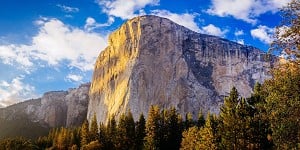With climate change, the outlook is not good for the long term in many areas of life and I guess Alpine mixed climbing is just one of many things which will be impacted. Not that big a deal in the grand scheme of things but certainly a pity.
After the amazing conditions in September 2014 which followed a wet and unstable summer, the Alps have seen a succession of hot summers and a couple of dry winters. Even the heavy snowfall of last winter wasn’t sufficient to bring many routes into decent condition, though it was good for filling up crevasses. As far as I can tell, winter snow isn’t actually what’s needed for the mixed to build up - it needs ‘sticky’ snow in autumn and spring when it’s not too cold, whereas in winter it’s too cold for the snow to turn into neve and ice.
Over the last three spring seasons it seems that conditions have been getting increasingly dry, with very few routes in decent condition this year. Even the ‘always in’ Chere was looking shockingly bare by the end of the summer season this year. The way this autumn has been going so far, I can’t see things improving much. You never know of course what the weather might bring but it feels like there’s a trend there and it’s not good. Perhaps we’ve now gone past the point where the mixed has been damaged to such an extent that it’s going to be pretty hard for good conditions to ever build up again, particularly in the context of a warming climate. At some stage a turning point will be reached beyond which it will be rare to find the mixed in decent nick - I’m wondering if we’ve now reached that stage.
It would be great to hear from people who’ve been climbing in the Alps since the 60s/70s/80s whether they recall such a bad spell in the past. I’m conscious that just because we’ve had a few bad seasons doesn’t mean we will have more bad seasons but equally the climate isn’t getting cooler on the whole...
Just to be clear, what I’m referring to are goulotte style routes and classic north face mixed, rather than snowed up rocky ridges or ‘modern’ dry tooling style mixed (I quite like dry tooling, so may be this will be the way to go in the Alps but I do like the mixed to actually be mixed!).









